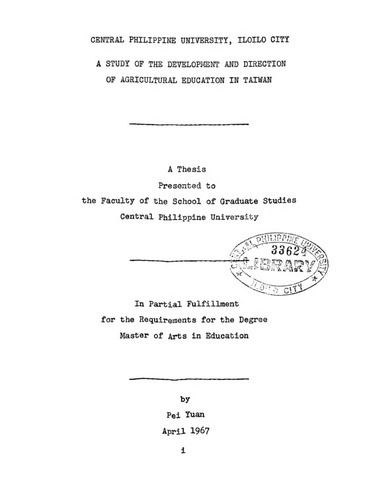A study of the development and direction of agricultural education in Taiwan
Abstract
The purpose of this study was to explore the historical evidence, and to investigate the recent aspects and processes of agricultural education in Taiwan. This study dealt with major aspects of the historical development of agricultural education from the end of the nineteenth century down to the twentieth century. It discussed development and growth progression of agricultural education in Taiwan, including the development of systems, organizations, curricula, instructional methods, practices, activities, and a criticism of the plan, projects, and present direction of agricultural education.
The methods of documentary survey and the report of personal experience were used. It is a study of historical facts and recent development as they are with interpretation. Basic documentary information for study in this survey were collected from several academic and agricultural institutions, for example: Institute of Modern History, Department of Education, colleges of agriculture in universities, and agricultural vocational schools in Taiwan.
The significant findings of the study were as follows:
1. The two historical factors that influenced the development of agricultural vocational education in Taiwan are the historical progress of agricultural education in China and the educational policy of Japanese colonialism.
2. The educational system and the administrative organization within the schools of Taiwan have preserved many of the original features but have undergone many revisions. The administrative organization of Taiwan follows the rule of centralization.
3. The curricular offerings of agricultural schools are limited by multiple laws and regulations.
4. Taiwan agricultural schools use four kinds of instructional methods; namely, lecture, leading-question, project, and self-guidance. The practices used in agricultural education are agricultural curricular practice, general practice, practice in home-farm, and practices interposed between terms. The extra-curricular activities are assistances to instructional programs.
5. The teacher training programs for agricultural schools are divided into two kinds; namely, the preparatory teachers’ training, and the teachers’ reeducation or inservice training.
6. The farmer-training program is an extra responsibility of the agricultural school. It is a program with projects and planning for adult education in agricultural improvement.
7. Under the present educational conditions of Taiwan, there are no agricultural programs in the elementary schools. Agricultural education in this study refers to secondary and post-secondary schools.
8. The objectives and regulations regarding agricultural education are determined by the national constitution, in Section 5. Article 158 through Article 167, which lists the fundamental objectives of agricultural education. The principal objective of agricultural education is to develop and enrich rural life by acquainting future farmers with modern farming methods and better agricultural techniques.
This study presented the recent developments in the dynamics of educational change and the relationship between education and the culture in which it operates; its historical evidence, present conditions; and its future direction.
The findings of this study are presented to help the personnel of private and government agencies and educators to know some aspects of agricultural education in Taiwan. The findings may have value for persons carrying on comparative research and investigation in the field of agricultural education.
Description
Abstract and full text available
Suggested Citation
Pei, Y. (1967). A study of the development and direction of agricultural education in Taiwan (Unpublished Master’s thesis). Central Philippine University, Jaro, Iloilo City.
Type
ThesisSubject(s)
Keywords
Department
School of Graduate StudiesDegree
Master of Arts in EducationShelf Location
GSL Theses 378.242 P35
Physical Description
xi, 159 leaves


